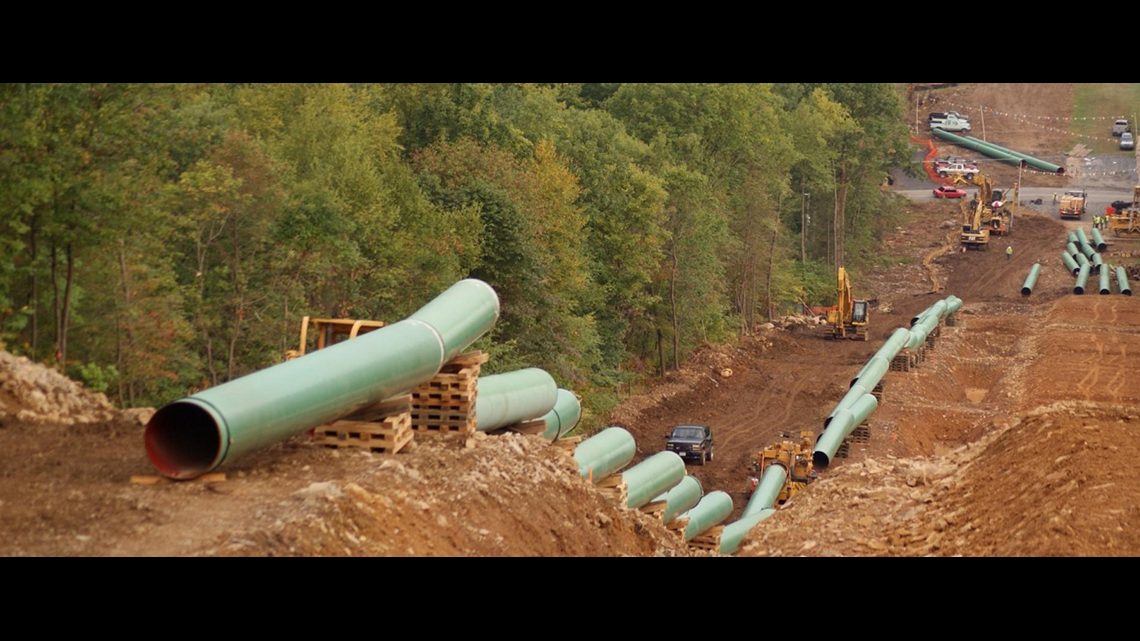

(photo: Lancaster Against Pipelines)
The group Lancaster Against Pipelines held a meeting Wednesday night in Conestoga, Lancaster County. It was packed. Many people there had just received letters from the pipeline company, Williams Partners, telling them the proposed Central Penn South natural gas pipeline will cut through their property.
“I’m furious,” says landowner Nancy Jeffries. “They just come in and do what they want to do.”
“I thought about explosions,” says landowner Debbie Swanson. “I thought about well, what does this mean in the future if we want to develop our property.”
The group discussed fears about safety. They say this pipeline will run at a higher pressure than normal for pipelines.
“We’re dealing with an almost experimental situation here,” says Luke Bunting, Conestoga resident. “And past explosions have been absolutely devastating.”
This pipeline will be used to take some of the load of the already-existing Transco Pipeline as a shortcut. The group says Williams Partners should widen that pipeline instead of building a new one.
Williams Partners responded to issues raised at this meeting in a statement:
Purpose & Need
- The Atlantic Sunrise project is being designed to connect abundant, domestic natural gas supplies in northeastern PA with natural gas consumers throughout the Mid-Atlantic and Southeastern United States.
- The Transco pipeline is a major transporter of natural gas in the U.S., transporting about 10% of all of the gas consumed in the U.S. The Atlantic Sunrise project is an expansion of the Transco pipeline system, connecting domestic supply with established U.S. markets and helping facilitate the goal of energy independence.
Environmental
- Our goal is to develop this project in a way that minimizes or avoids environmental impacts to the greatest degree practical. This is a very long process that involves a very extensive environmental analysis. It also involves a considerable amount of input from property owners, communities and environmental organizations.
- We will be working closely with federal and state permitting agencies to develop installation plans and mitigation techniques that result in avoiding or minimizing the effects of pipeline construction.
Possible Routes
- Our current primary route is a starting point for us. We expect the route to be adjusted and tweaked based on feedback we receive from property owners and other stakeholder groups. We will file a primary route, as well as route alternatives, with the FERC as part of our FERC certificate application early next year.
Risks
- The safety of the pipeline is the most important aspect of our operations. We have operated the Transco pipeline safely in Lancaster County, Pa., for many, many years, and we will operate the Central Penn Line with the same level of commitment. For the Central Penn Line, we are exceeding federal safety regulations in a number of important areas, including:
o Installing thicker wall pipe than required in some areas
o During construction, x-raying 100% of welds
o Hydro-testing at a higher pressure than required before the line is placed into service
o Once in-service, conducting in-line inspections on more pipe than required
Well Water
- Transco land agents will solicit input from each affected landowner about the number and location of water wells that are present on their property.
- Prior to construction, Transco will seek landowner permission to test all wells within 150-feet of the construction footprint before and after construction.
- Any problems with tested water wells after construction begins will be promptly resolved by the company.
Opportunities for Input
- Public participation in the open houses is very important. The FERC pre-filing process is a collaborative process, and one of the first opportunities that interested parties have to learn more about the project is during our open houses. The meetings are informal, providing attendees the opportunity to view detailed project maps, talk one-on-one with project engineers and other members of the project team to learn more about the regulatory process, ask questions and share feedback. It is also a chance for the Williams team to gather more information on potential issues that may exist within the study corridor so that we can work to identify solutions to those issues in our pipeline design.
